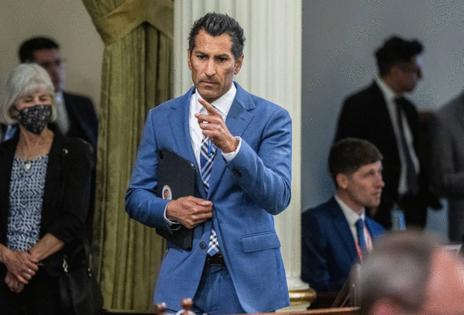California lawmakers make first moves to improve housing affordability
Published in News & Features
SACRAMENTO, Calif. — California lawmakers moved forward four housing affordability bills Tuesday, one of their first concrete actions to lower costs for state residents so far this year.
During remarks to members Tuesday, Speaker of the Assembly Robert Rivas, D-Salinas, said the bills would “alter the trajectory of California’s housing crisis.” They include measures to allow homeowners and developers to bypass their local building department, require state permitting departments to move faster and freeze current building standards to block more restrictive ones in the future.
“These bills will reduce bureaucracy and red tape. They will lead to fewer construction delays and cost overruns,” Rivas said. “These bills are a first step in putting California back on a path to build more housing and do so quickly.”
Assembly members also approved five bills specifically having to do with housing people and accelerating building in the aftermath of the destructive fires in Los Angeles. Rivas is co-author on all four of the housing affordability bills, and two of the Los Angeles recovery bills. All nine bills include an urgency clause, meaning they would become law immediately upon the governor’s signature. They will now go to the Senate for review.
Assembly Republicans called out their colleagues on the floor for not being bolder in their regulatory rollbacks.
“For years, Republicans have been demanding an end to the bureaucratic hurdles and red tape that prevent us from building enough housing,” said Assemblymember James Gallagher, R-Chico, in a statement. “It never should have taken this long and we have much more to do.”
A change in pro-housing legislation
Rivas made it clear that tackling affordability would be the main priority of the 2024-2025 legislative session, calling housing affordability specifically the “civil rights struggle of our time.”
But a few months into the session, the Democratic affordability agenda has taken a more piecemeal than cohesive approach with bills focused on providing lunches in K-12 schools, providing parking for homeless students and reducing utility bills.
Jason Ward, an economist and codirector of the RAND Center on Housing and Homelessness, said housing costs are almost “the whole story” of California’s affordability crisis. He called the four bills advanced by the Legislature “encouraging.”
“They’re pretty in the weeds, which is kind of where you need to be working, I think, to resolve a lot of the problems with housing production and housing production costs in the state,” he said.
Assembly Bill 253, for instance, authored by Rivas and Assemblymember Chris Ward, D-San Diego, would allow builders to hire a licensed third-party professional to check compliance if their local building department takes longer than 30 days to review their permit. Assemblymember Ward said it can currently take up to nine months for people to receive permits to build.
Jason Ward, the economist, said that over the past decade, California’s housing legislation has made building approvals contingent on meeting a long list of requirements, like having a certain amounts of affordable units, and using highly paid labor. He said only “unicorn” projects get streamlined.
The bills passed Wednesday, as well as some recent proposals introduced by Assemblymember Buffy Wicks, D-Oakland, are a break from the “California tradition,” he said.
“They look like: ‘We’ve identified a problem that is slowing housing production. Here is a law that will, you know, limit or remove that problem.’ So it seems like these things represent a step in the right direction,” Ward said.
_____
©2025 The Sacramento Bee. Visit sacbee.com. Distributed by Tribune Content Agency, LLC.







Comments